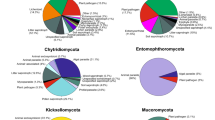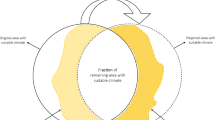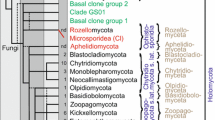Abstract
Progress in phylogenetic community ecology is often limited by the availability of phylogenetic information and the lack of appropriate methods and solutions to deal with this problem. We estimate the effect of the lack of phylogenetic information on the relations among taxa measured by commonly used phylogenetic metrics in comparative studies and community ecology, namely: Blomberg’s K phylogenetic signal, Faith’s Phylogenetic Diversity (PD), Mean Phylogenetic Distance (MPD) and Mean Nearest Taxon Distance (MNTD). To overcome this problem, we tested two possible solutions: Polytomic trees and Operational trees. Our results show that the effects on K values strongly depended on the level of phylogenetic signal. In the case of the community metrics, the effects were insensitive to the patterns of species distribution in the communities. Community metrics tended to be overestimated with both Polytomic and Operational trees, but the overestimation was higher with Polytomic trees. PD and MPD metrics were less biased than MNTD metric. We show that the lack of phylogenetic resolution is not necessarily problematic for all analyses and that its effect will depend on the chosen metric and on the solutions used to deal with the problem. Based on our results, we suggest that ecologists should prefer the Operational tree solution to remove polytomies in the phylogenetic tree and take careful consideration while designing experiments, and analyzing and interpreting the results of phylogenetic metrics.






Similar content being viewed by others
Availability of data and material
This paper uses no data.
Code availability
Not applicable.
References
Bastazini VAG, Ferreira PMA, Azambuja BO, Casas G, Debastiani VJ, Guimarães PR, Pillar VD (2017) Untangling the tangled bank: a novel method for partitioning the effects of phylogenies and traits on ecological networks. Evol Biol 44:312–324. https://doi.org/10.1007/s11692-017-9409-8
Bastazini VAG, Debastiani VJ, Azambuja BO, Guimarães PR, Pillar VD (2019) Loss of generalist plant species and functional diversity decreases the robustness of a seed dispersal network. Environ Conserv 46:52–58. https://doi.org/10.1017/S0376892918000334
Blomberg SP, Garland T, Ives AR (2003) Testing for phylogenetic signal in comparative data: behavioral traits are more labile. Evolution (NY) 57:717–745. https://doi.org/10.1111/j.0014-3820.2003.tb00285.x
Boyle EE, Adamowicz SJ (2015) Community phylogenetics: assessing tree reconstruction methods and the utility of DNA barcodes. PLoS ONE 10:1–18. https://doi.org/10.1371/journal.pone.0126662
Brum FT, Graham CH, Costa GC, Hedges SB, Penone C, Radeloff VC, Rondinini C, Loyola R, Davidson AD (2017) Global priorities for conservation across multiple dimensions of mammalian diversity. Proc Natl Acad Sci USA 114:7641–7646. https://doi.org/10.1073/pnas.1706461114
Cavender-Bares J, Kozak KH, Fine PVA, Kembel SW (2009) The merging of community ecology and phylogenetic biology. Ecol Lett 12:693–715. https://doi.org/10.1111/j.1461-0248.2009.01314.x
Chase MW, Christenhusz MJM, Fay MF, Byng JW, Judd WS, Soltis DE, Mabberley DJ, Sennikov AN, Soltis PS, Stevens PF, Briggs B, Brockington S, Chautems A, Clark JC, Conran J, Haston E, Möller M, Moore M, Olmstead R, Perret M, Skog L, Smith J, Tank D, Vorontsova M, Weber A (2016) An update of the angiosperm phylogeny group classification for the orders and families of flowering plants: APG IV. Bot J Linn Soc 181:1–20. https://doi.org/10.1111/boj.12385
Cooper N, Jetz W, Freckleton RP (2010) Phylogenetic comparative approaches for studying niche conservatism. J Evol Biol 23:2529–2539. https://doi.org/10.1111/j.1420-9101.2010.02144.x
Craven D, Eisenhauer N, Pearse WD, Hautier Y, Isbell F, Roscher C, Bahn M, Beierkuhnlein C, Bönisch G, Buchmann N, Byun C, Catford JA, Cerabolini BEL, Cornelissen JHC, Craine JM, De Luca E, Ebeling A, Griffin JN, Hector A, Hines J, Jentsch A, Kattge J, Kreyling J, Lanta V, Lemoine N, Meyer ST, Minden V, Onipchenko V, Polley HW, Reich PB, van Ruijven J, Schamp B, Smith MD, Soudzilovskaia NA, Tilman D, Weigelt A, Wilsey B, Manning P (2018) Multiple facets of biodiversity drive the diversity–stability relationship. Nat Ecol Evol 2:1579–1587. https://doi.org/10.1038/s41559-018-0647-7
Davies TJ (2021) Ecophylogenetics redux. Ecol Lett. https://doi.org/10.1111/ele.13682
Davies TJ, Kraft NJB, Salamin N, Wolkovich EM (2012) Incompletely resolved phylogenetic trees inflate estimates of phylogenetic conservatism. Ecology 93:242–247. https://doi.org/10.1890/11-1360.1
Debastiani VJ, Duarte LDS (2017) Evolutionary models and phylogenetic signal assessment via mantel test. Evol Biol 44:135–143. https://doi.org/10.1007/s11692-016-9396-1
Debastiani VJ, Müller SC, Oliveira JM, Rocha FS, Sestren-Bastos MC, Duarte LDS (2015) Recurrent patterns of phylogenetic habitat filtering in woody plant communities across phytogeographically distinct grassland-forest ecotones. Community Ecol 16:1–9. https://doi.org/10.1556/168.2015.16.1
Duarte LDS, Both C, Debastiani VJ, Carlucci MB, Gonçalves LO, Cappelatti L, Seger GDS, Bastazini VAG, Brum FT, Salengue EV, Bernardo-Silva JS (2014) Climate effects on amphibian distributions depend on phylogenetic resolution and the biogeographical history of taxa. Glob Ecol Biogeogr 23:213–222. https://doi.org/10.1111/geb.12089
Emerson BC, Gillespie RG (2008) Phylogenetic analysis of community assembly and structure over space and time. Trends Ecol Evol 23:619–630. https://doi.org/10.1016/j.tree.2008.07.005
Faith DP (1992) Conservation evaluation and phylogenetic diversity. Biol Conserv 61:1–10. https://doi.org/10.1016/0006-3207(92)91201-3
Felsenstein J (1985) Phylogenies and the comparative method. Am Nat 125:1–15
Freckleton RP, Harvey PH (2006) Detecting non-Brownian trait evolution in adaptive radiations. PLoS Biol 4:2104–2111. https://doi.org/10.1371/journal.pbio.0040373
Gerhold P, Cahill JF, Winter M, Bartish IV, Prinzing A (2015) Phylogenetic patterns are not proxies of community assembly mechanisms (they are far better). Funct Ecol 29:600–614. https://doi.org/10.1111/1365-2435.12425
Grafen A (1989) The phylogenetic regression. Philos Trans R Soc London B, Biol Sci 326:119–157. https://doi.org/10.1098/rstb.1989.0106
Gravel D, Bell T, Barbera C, Combe M, Pommier T, Mouquet N (2012) Phylogenetic constraints on ecosystem functioning. Nat Commun 3:1116–1117. https://doi.org/10.1038/ncomms2123
Hadfield JD, Krasnov BR, Poulin R, Nakagawa S (2014) A tale of two phylogenies: comparative analyses of ecological interactions. Am Nat 183:174–187. https://doi.org/10.1086/674445
Harmon LJ (2009) Phylogenetic comparative methods: learning from trees. Self-published under a CC-BY-4.0 license
Harmon LJ, Weir JT, Brock CD, Glor RE, Challenger W (2008) GEIGER: investigating evolutionary radiations. Bioinformatics 24:129–131. https://doi.org/10.1093/bioinformatics/btm538
Hillis DM, Pollock DD, McGuire JA, Zwickl DJ (2003) Is sparse taxon sampling a problem for phylogenetic inference? Syst Biol 52:124–126. https://doi.org/10.1080/10635150390132911
Jarzyna MA, Jetz W (2016) Detecting the multiple facets of biodiversity. Trends Ecol Evol 31:527–538. https://doi.org/10.1016/j.tree.2016.04.002
Jetz W, Thomas GH, Joy JB, Hartmann K, Mooers AO (2012) The global diversity of birds in space and time. Nature 491:444–448. https://doi.org/10.1038/nature11631
Johnson MTJ, Stinchcombe JR (2007) An emerging synthesis between community ecology and evolutionary biology. Trends Ecol Evol 22:250–257. https://doi.org/10.1016/j.tree.2007.01.014
Kellner KF, Swihart RK (2014) Accounting for imperfect detection in ecology: a quantitative review. PLoS ONE. https://doi.org/10.1371/journal.pone.0111436
Kembel SW, Cowan PD, Helmus MR, Cornwell WK, Morlon H, Ackerly DD, Blomberg SP, Webb CO (2010) Picante: R tools for integrating phylogenies and ecology. Bioinformatics 26:1463–1464. https://doi.org/10.1093/bioinformatics/btq166
Kéry M, Schmid H (2004) Monitoring programs need to take into account imperfect species detectability. Basic Appl Ecol 5:65–73. https://doi.org/10.1078/1439-1791-00194
Kuhn TS, Mooers A, Thomas GH (2011) A simple polytomy resolver for dated phylogenies. Methods Ecol Evol 2:427–436. https://doi.org/10.1111/j.2041-210X.2011.00103.x
Lefcheck JS, Bastazini VAG, Griffin JN (2015) Choosing and using multiple traits in functional diversity research. Environ Conserv 42:104–107. https://doi.org/10.1017/S0376892914000307
Li D, Trotta L, Marx HE, Allen JM, Sun M, Soltis DE, Soltis PS, Guralnick RP, Baiser B (2019) For common community phylogenetic analyses, go ahead and use synthesis phylogenies. Ecology 100:1–15. https://doi.org/10.1002/ecy.2788
Liu J, Liu J, Shan YX, Ge XJ, Burgess KS (2019) The use of DNA barcodes to estimate phylogenetic diversity in forest communities of southern China. Ecol Evol 9:5372–5379. https://doi.org/10.1002/ece3.5128
Losos JB, Leal M, Glor RE, De Queiroz K, Hertz PE, Rodríguez Schettino L, Chamizo Lara A, Jackman TR, Larson A (2003) Niche lability in the evolution of a Caribbean lizard community. Nature 424:542–545. https://doi.org/10.1038/nature01814
Maddison DR, Schulz K-S, Maddison WP (2007) The tree of life web project. Zootaxa 1668:19–40. https://doi.org/10.11646/zootaxa.1668.1.4
Martins WS, Carmo WC, Longo HJ, Rosa TC, Rangel TF (2013) SUNPLIN: simulation with uncertainty for phylogenetic investigations. BMC Bioinform. https://doi.org/10.1186/1471-2105-14-324
Mayfield MM, Levine JM (2010) Opposing effects of competitive exclusion on the phylogenetic structure of communities. Ecol Lett 13:1085–1093. https://doi.org/10.1111/j.1461-0248.2010.01509.x
Mazel F, Davies TJ, Gallien L, Renaud J, Groussin M, Münkemüller T, Thuiller W (2016) Influence of tree shape and evolutionary time-scale on phylogenetic diversity metrics. Ecography (cop) 39:913–920. https://doi.org/10.1111/ecog.01694
Mcpeek MA (2007) The macroevolutionary consequences of ecological differences among species. Palaeontology 50:111–129. https://doi.org/10.1111/j.1475-4983.2006.00616.x
Miller ET, Farine DR, Trisos CH (2017) Phylogenetic community structure metrics and null models: a review with new methods and software. Ecography (cop) 40:461–477. https://doi.org/10.1111/ecog.02070
Molina-Venegas R, Rodríguez M (2017) Revisiting phylogenetic signal; strong or negligible impacts of polytomies and branch length information? BMC Evol Biol 17:1–10. https://doi.org/10.1186/s12862-017-0898-y
Mooers A, Gascuel O, Stadler T, Li H, Steel M (2012) Branch lengths on birth-death trees and the expected loss of phylogenetic diversity. Syst Biol 61:195–203. https://doi.org/10.1093/sysbio/syr090
Münkemüller T, Gallien L, Pollock LJ, Barros C, Carboni M, Chalmandrier L, Mazel F, Mokany K, Roquet C, Smyčka J, Talluto MV, Thuiller W (2020) Dos and don’ts when inferring assembly rules from diversity patterns. Glob Ecol Biogeogr 29:1212–1229. https://doi.org/10.1111/geb.13098
Nabhan AR, Sarkar IN (2012) The impact of taxon sampling on phylogenetic inference: a review of two decades of controversy. Brief Bioinform 13:122–134. https://doi.org/10.1093/bib/bbr014
Pagel M (1999) Inferring the historical patterns of biological evolution. Nature 401:877–884. https://doi.org/10.1038/44766
Paradis E, Claude J, Strimmer K (2004) APE: analyses of phylogenetics and evolution in R language. Bioinformatics 20:289–290. https://doi.org/10.1093/bioinformatics/btg412
Park DS, Worthington S, Xi Z (2018) Taxon sampling effects on the quantification and comparison of community phylogenetic diversity. Mol Ecol 27:1296–1308. https://doi.org/10.1111/mec.14520
Paterno GB, Penone C, Werner GDA (2018) SENSIPHY: an R-package for sensitivity analysis in phylogenetic comparative methods. Methods Ecol Evol 9:1461–1467. https://doi.org/10.1111/2041-210X.12990
Pillar VD, Duarte LDS (2010) A framework for metacommunity analysis of phylogenetic structure. Ecol Lett 13:587–596. https://doi.org/10.1111/j.1461-0248.2010.01456.x
Pollock DD, Zwickl DJ, McGuire JA, Hillis DM (2002) Increased taxon sampling is advantageous for phylogenetic inference. Syst Biol 51:664–671. https://doi.org/10.1080/10635150290102357
Pyron RA, Wiens JJ (2011) A large-scale phylogeny of Amphibia including over 2800 species, and a revised classification of extant frogs, salamanders, and caecilians. Mol Phylogenet Evol 61:543–583. https://doi.org/10.1016/j.ympev.2011.06.012
Qian H, Zhang J (2016) Are phylogenies derived from family-level supertrees robust for studies on macroecological patterns along environmental gradients? J Syst Evol 54:29–36. https://doi.org/10.1111/jse.12161
R Core Team (2019) R: A language and environment for statistical computing. R Foundation for Statistical Computing, Vienna, Austria
Rabosky DL (2015) No substitute for real data: a cautionary note on the use of phylogenies from birth-death polytomy resolvers for downstream comparative analyses. Evolution (NY) 69:3207–3216. https://doi.org/10.1111/evo.12817
Rangel TF, Colwell RK, Graves GR, Fučíková K, Rahbek C, Diniz-Filho JAF (2015) Phylogenetic uncertainty revisited: implications for ecological analyses. Evolution (n Y) 69:1301–1312. https://doi.org/10.1111/evo.12644
Revell LJ (2012) phytools: an R package for phylogenetic comparative biology (and other things). Methods Ecol Evol 3:217–223. https://doi.org/10.1111/j.2041-210X.2011.00169.x
Revell LJ, Harmon LJ, Collar DC (2008) Phylogenetic signal, evolutionary process, and rate. Syst Biol 57:591–601. https://doi.org/10.1080/10635150802302427
Roth T, Allan E, Pearman PB, Amrhein V (2018) Functional ecology and imperfect detection of species. Methods Ecol Evol 9:917–928. https://doi.org/10.1111/2041-210X.12950
Schulte JA (2013) Undersampling taxa will underestimate molecular divergence dates: an example from the South American Lizard Clade Liolaemini. Int J Evol Biol 2013:1–12. https://doi.org/10.1155/2013/628467
Schweiger AK, Cavender-Bares J, Townsend PA, Hobbie SE, Madritch MD, Wang R, Tilman D, Gamon JA (2018) Plant spectral diversity integrates functional and phylogenetic components of biodiversity and predicts ecosystem function. Nat Ecol Evol 2:976–982. https://doi.org/10.1038/s41559-018-0551-1
Silvestro D, Kostikova A, Litsios G, Pearman PB, Salamin N (2015) Measurement errors should always be incorporated in phylogenetic comparative analysis. Methods Ecol Evol 6:340–346. https://doi.org/10.1111/2041-210X.12337
Spasojevic MJ, Suding KN (2012) Inferring community assembly mechanisms from functional diversity patterns: the importance of multiple assembly processes. J Ecol 100:652–661. https://doi.org/10.1111/j.1365-2745.2011.01945.x
Swenson NG (2009) Phylogenetic resolution and quantifying the phylogenetic diversity and dispersion of communities. PLoS ONE 4:e4390. https://doi.org/10.1371/journal.pone.0004390
Swenson NG (2019) Phylogenetic ecology. University of Chicago Press, Chicago, London
Swenson NG, Worthy SJ (2018) Phylogenetic resolution and metrics of biodiversity and signal in conservation. In: Scherson R, Faith DP (eds) Phylogenetic diversity applications and challenges in biodiversity science. Springer International Publishing, Cham, pp 93–110
Verhoef HA, Morin PJ (2010) Community ecology: processes, models, and applications. Oxford University Press
Webb CO, Donoghue MJ (2005) Phylomatic: tree assembly for applied phylogenetics. Mol Ecol Notes 5:181–183. https://doi.org/10.1111/j.1471-8286.2004.00829.x
Webb CO, Ackerly DD, McPeek MA, Donoghue MJ (2002) Phylogenies and community ecology. Annu Rev Ecol Syst 33:475–505. https://doi.org/10.1146/annurev.ecolsys.33.010802.150448
Whittaker RJ, Araújo MB, Jepson P, Ladle RJ, Watson JEM, Willis KJ (2005) Conservation biogeography: assessment and prospect. Divers Distrib 11:3–23. https://doi.org/10.1111/j.1366-9516.2005.00143.x
Wiens JJ, Ackerly DD, Allen AP, Anacker BL, Buckley LB, Cornell HV, Damschen EI, Jonathan Davies T, Grytnes JA, Harrison SP, Hawkins BA, Holt RD, McCain CM, Stephens PR (2010) Niche conservatism as an emerging principle in ecology and conservation biology. Ecol Lett 13:1310–1324. https://doi.org/10.1111/j.1461-0248.2010.01515.x
Yang Z, Rannala B (2012) Molecular phylogenetics: principles and practice. Nat Rev Genet 13:303–314. https://doi.org/10.1038/nrg3186
Zhu L, Fu B, Zhu H, Wang C, Jiao L, Zhou J (2017) Trait choice profoundly affected the ecological conclusions drawn from functional diversity measures. Sci Rep 7:1–13. https://doi.org/10.1038/s41598-017-03812-8
Acknowledgements
VJD was supported by the Coordenação de Aperfeiçoamento de Pessoal de Nível Superior (CAPES) through a postdoctoral grant, and VDP by the Brazilian National Research Council (CNPq grant 307689/2014-0).
Funding
Financial support was provided by Coordenação de Aperfeiçoamento de Pessoal de Nível Superior (CAPES) through a postdoctoral grant, and VDP by the Brazilian National Research Council (CNPq grant 307689/2014-0).
Author information
Authors and Affiliations
Contributions
VJD conceived, designed and executed this study. VDJ, VAGB and VDP wrote the manuscript. All authors reviewed and approved the final version.
Corresponding author
Ethics declarations
Conflict of interest
The authors declare that they have no conflict of interest.
Ethics approval
Not applicable.
Consent to participate
Not applicable.
Consent for publication
Not applicable.
Additional information
Communicated by Juan Ernesto Guevara.
Supplementary Information
Below is the link to the electronic supplementary material.
Rights and permissions
About this article
Cite this article
Debastiani, V.J., Bastazini, V.A.G. & Pillar, V.D. Phylogenetic uncertainty and the inference of patterns in community ecology and comparative studies. Oecologia 196, 633–647 (2021). https://doi.org/10.1007/s00442-021-04972-1
Received:
Accepted:
Published:
Issue Date:
DOI: https://doi.org/10.1007/s00442-021-04972-1




